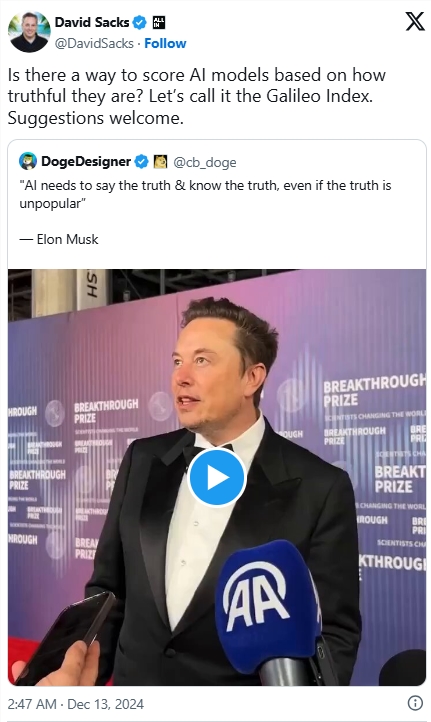In the context of Trump's possible re-election, Silicon Valley technology giants are actively participating in American politics and playing the role of technology advisors to the president. Among them, people such as Elon Musk, Marc Andreessen and David Sachs are particularly influential, and their concerns about AI censorship have attracted widespread attention. This article will delve into the concerns of these tech elites and how they are trying to deal with the potential risks of political manipulation in AI technology.
With Trump back in the White House, Silicon Valley's top technology entrepreneurs are quietly becoming the president's key technology advisers. Elon Musk, Marc Andreessen and David Sachs, among others, are advising Trump, most notably through their strong criticism of AI censorship.
This group of technology elites believes that AI chatbots are becoming a new ideological battlefield. Their core concern is that large technology companies may spread specific political positions through AI systems, achieving a more covert and effective "censorship."
What exactly does AI censorship mean? Simply put, it means that technology companies may embed specific positions in the responses of AI chatbots to guide users towards preset views. This kind of manipulation is more direct and powerful than the algorithmic censorship of traditional social media, because AI can directly give an answer that seems objective but has actually been tuned.

The specific case is quite dramatic. Google Gemini's image generation feature caused an uproar. When users asked about the Founding Fathers of the United States or German soldiers in World War II, the system generated diverse images that were clearly not historically accurate. Musk and Andreessen saw this as a stark display of ideological bias at tech companies.
The concerns of these Silicon Valley bosses are not groundless. They note that AI systems may:
Deliberately avoiding or misinterpreting facts on sensitive topics
Communicate a specific position in a seemingly neutral way
Limiting diversity of information through "politically correct" replies
Musk took direct action. He created xAI and Grok chatbots, clearly targeting ChatGPT, which was "infected by political correctness". Sacks put it more bluntly, saying that these AI systems are "feeding lies."
For the Trump campaign, AI censorship has become a political issue. They may try to curb the ideological penetration of big technology companies in the field of AI through investigations, legal proceedings, or policy intervention.
It is worth noting that behind this controversy is a complex game of technology, politics and ideology. Today, with the rapid development of AI, who will define "truth" and who will control the values of AI systems is not only a technical issue, but also a profound social governance problem.
Taken together, the controversy surrounding AI censorship reflects an increasingly complex power play among tech giants, politicians and the public. How to ensure the fairness and transparency of AI technology will become a key issue that requires continued attention and resolution in the future.